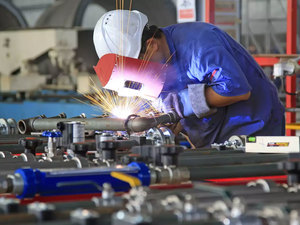New Delhi: The dusty tracts of Naraina and Mayapuri industrial areas in Delhi have similar stories to share. The clusters of small manufacturing units in both these areas are suffering losses as a result of weekend restrictions due to the pandemic. The small factory owners as well as their workers are now in search of some other source of income.
Since the onset of industrialisation, manufacturing units have played a very important role in the growth of the Indian economy. As per available data, the sector accounts for 16%-17% of GDP and employs nearly 20% of the country’s workforce. The pandemic has, however, impacted the scenario to a great extent.
During the first wave, the restrictions on movement of goods and services significantly affected the workforce and disrupted supply chains, halting almost all manufacturing operations. During the second wave, similar restrictions led to heavy losses to businesses and shutdown of units.
Though almost 6 months have elapsed, the scenario has not improved much. Several sectors are on the path to recovery, but the profit margin still remains narrow and the companies are now looking for other ways to accelerate production and generate better profits.
Unfortunately, the owners have reduced the number of workers to the minimum level though the workload remains almost the same. The restrictions have affected their import-export business, and most of the products are lying unsold.
A worker of a paper box manufacturing unit in Naraina industrial area told ‘The Sunday Guardian’, “In the first wave, our work and production weren’t affected much as many companies had stocked the raw materials in advance. During the pandemic, however, the cost of raw materials skyrocketed, affecting the companies and their clients. Payments were delayed in the second wave, and the problem is persisting even now.”
The pandemic has also resulted in fewer overtime hours, and while many workers are pleased about their reduced workload, most are concerned about payment delays. “Before the pandemic, we used to work for 8 hours straight or even longer. Now, we don’t work overtime and have a lot of free time. But the profit margin has gone down drastically from 80% to 50%,” he chuckled.
The scenario was almost similar when this correspondent visited a manufacturing unit in the neighbouring Mayapuri industrial area that develops machinery for hydropower plants and general engineering.
One of the major challenges that all of the units have been dealing with is payment delays, which have resulted in job layoffs and wage reductions.
“Currently, we have 5-6 permanent workers and 10-15 machines. We had many permanent workers before the pandemic. But some workers left due to delay in payments,” said Neeraj of the manufacturing unit Devraj Engineering.
Similarly, the workers of an oil manufacturing unit in Mayapuri have also been upset about their payments. At present, 38-40 workers are working for the unit. “Our owner initially tried hard to manage things to live up to his reputation and we continued our work despite all the restrictions. But later, the situation turned worse. Earlier, we had so many workers, but many of them went back to their villages, leaving us struggling. I don’t know what will happen if another lockdown is imposed,” one of the workers told this correspondent.
Small automobile manufacturing units are also suffering from the same blow. However, unlike large manufacturing units, they hire temporary workers who are always ready to leave whenever a better opportunity is available.
That makes the situation volatile.
Inderjeet, who runs a small automobile manufacturing unit, told this correspondent, “We always employ temporary workers. Currently, I have three workers who all live nearby. These workers are paid around Rs 7,000 per month. Due to the pandemic, our profit margin has reduced to half. To top it, we have not been receiving any work orders these days.”
Small manufacturing units struggling to survive
- Advertisement -

